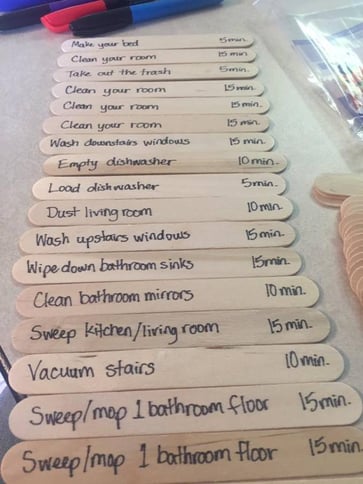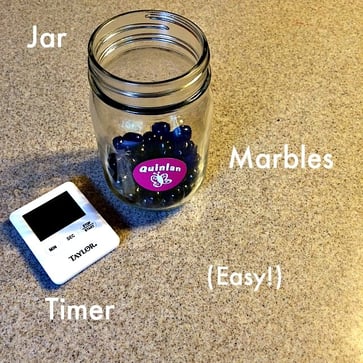
So its the school holidays and the weather sucks. The sound of the TV is ever-present and, despite your best intentions, the kids have been on their iPods/PlayStation/Xbox/Wii far longer than you know is healthy. We all know too much screen time is damaging for kids but policing it is an eternal challenge. We hear you!
Here are some strategies for controlling screen time in your house:
1. Set parameters
Decide what your rules will be and stick to them. Don’t give in and let the kids have an extra hour of Minecraft just because you are in the middle of sorting out some paperwork and it’s convenient.
Restrictions might include:
- Time limits
- Device curfews
- No TV in the bedroom
- Age-appropriate content
- No texting during mealtimes
2. Provide alternatives
Watching TV or playing computer games is an easy default for kids who struggle to find fun things to do. Sometimes they need to be handed a bag of junk to make ‘robots’ out of, driven to the park to play or given a hula-hoop, skipping rope or chin-up bar to challenge themselves with. Parents shouldn’t be expected to micro-manage their kids’ time but they can nudge their children in the direction of alternative activities.
3. Model it
We can’t expect our kids to lay off the electronica if we are continually watching TV, texting or playing Candy Crush ourselves. If they see us reading, exercising, making something or enjoying other activities, they are more likely to follow suit.
4. Time it
Young children have a poor understanding of time and older children can be too engrossed in their games to look at their watch. Set an egg-timer, alarm or buzzer to give an audible signal when time is up.
5. Choke it
Use tech to control tech. There are many settings, apps and widgets that allow parents to restrict device usage automatically. Here are a few:
- Xbox: https://support.xbox.com/en-US/help/xbox-360/security/how-to-set-family-timer – How to set time restrictions and other settings on Xbox 360.
- PlayStation, Wii, Windows-based computers:http://www.esrb.org/about/settingcontrols.jsp - How to activate controls.
- iPhone and iPad: https://support.apple.com/en-au/HT201304
- Android: https://play.google.com/store/apps/details?id=com.screentime - Allows parents to add bonus time as a reward for eg helping around the house
6. Make them earn it
Use screen time as a reward. This might be a simple ‘no screen time until chores are done’ or you could get creative and award screen time in blocks of minutes based on accomplished goals.
For example, if you have a reluctant reader who needs to spend more time with their nose in a book, you might apply the equation ’30 minutes reading a book = 30 minutes’ screen time’. If your child needs more exercise, you might match their active minutes with screen minutes.
Here is a great idea for rewarding children for help around the house with screen minutes:
http://www.thebudgetdiet.com/diy-chore-chart
For younger children, you could use marbles to represent blocks of time, as explained here:
http://coolmomtech.com/2014/06/how-to-manage-screen-time-over-the-summer/
7. Trade it
Offer appealing rewards and alternatives in exchange for screen time, eg skip screen time today for a trip to Dreamworld tomorrow, exchange evening TV this week for a playdate with a friend at the weekend.
8. Start as late as possible
Avoid allowing children to start the day with TV, PDA or computer games. Once they are on, it is very hard to get them off and it can set a bad tone for the rest of the day. Encourage kids to have breakfast, get dressed, complete chores and do some other recreational activities before the screens go on.
9. Get out of the house
Go to the beach, skate park, playground. Go camping for the weekend. Go for a walk, run, swim, kick a ball about. Spend a few hours away from the home where there are no screens to distract anyone. Rediscover simple pleasures.
10. Plan it
Let older children take responsibility for their actions: Call a family meeting, discuss what everybody thinks is reasonable and healthy regarding screen time and draw up an agreement/schedule for everyone to stick to.
And if you can't beat them ...
Share it
One of the most damaging things about too much screen time is the potential isolation and lack of social interaction for your child. By getting involved and sharing the electronic experience, you can turn it into a fun, positive, family-bonding affair:
- Join in a game with your kids, show interest in their Minecraft creations, find out how Clash of Clans works.
- Enjoy a family movie afternoon.
- Make it a social event - invite friends round for a SingStar or JustDance competition, challenge the kids at Wii Sports, schedule a weekly gaming night that the whole family can look forward to.
- Collaborate on a creative electronic project - film a home movie or sketch and upload it to YouTube, write and publish a family blog, learn to code simple animations and games together using Scratch, get kids to write/present reviews of games and movies.












